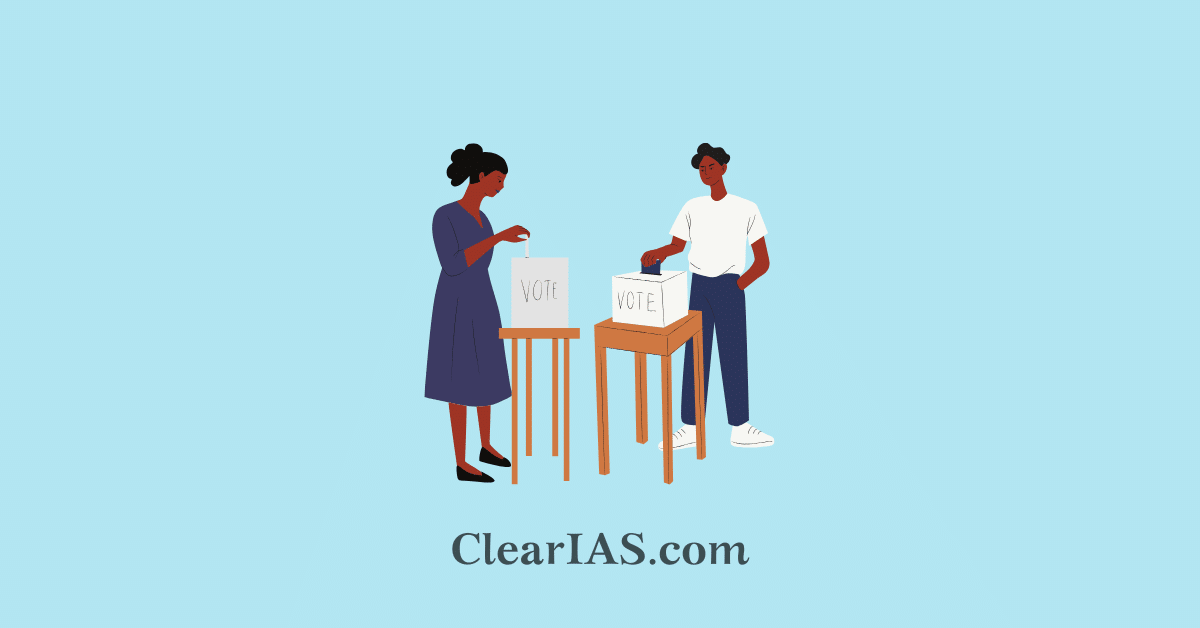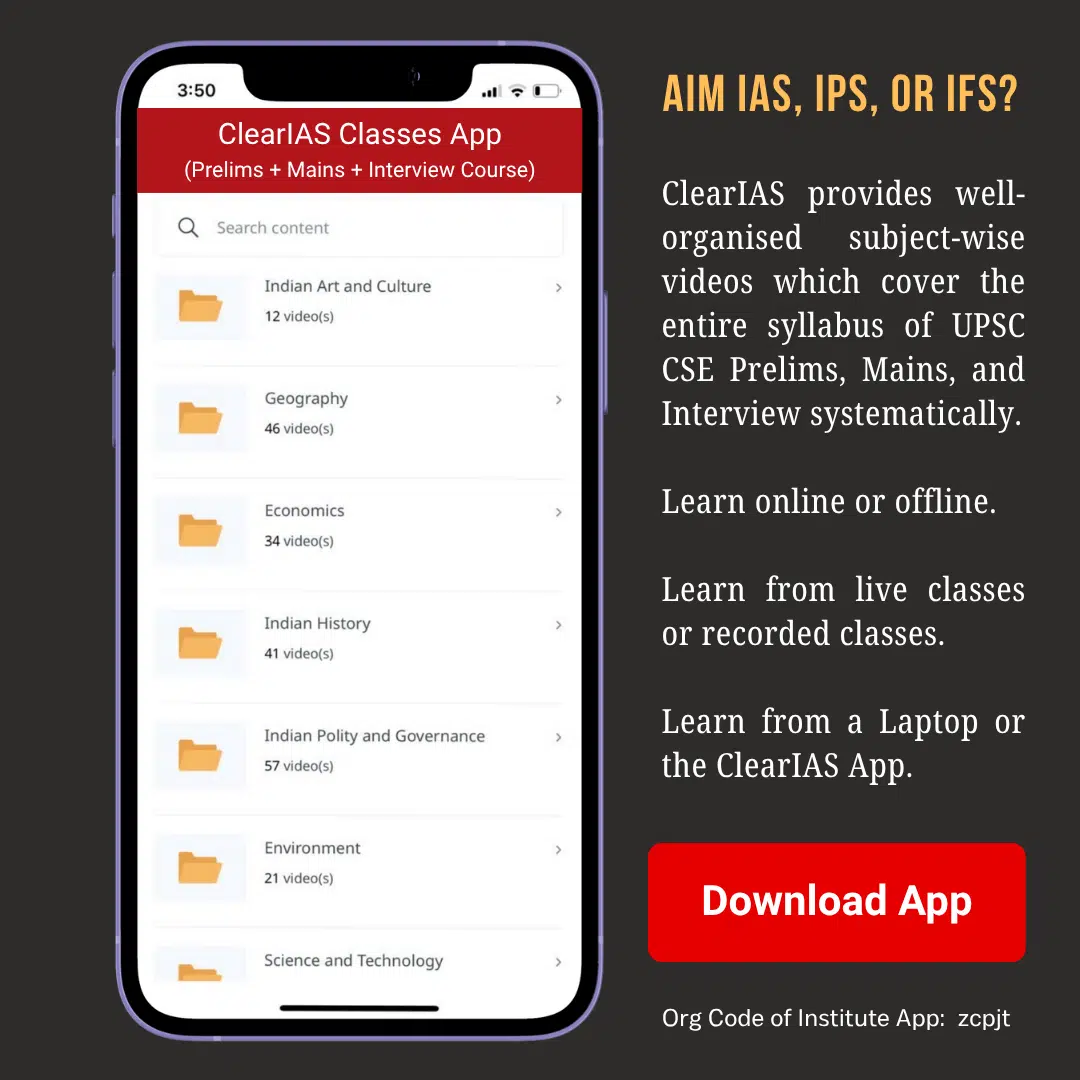
Right to Vote vs. Freedom of Voting: Read here to understand the difference from a Constitutional and Legal Perspective.
The right to vote is the cornerstone of a democratic polity. It empowers citizens to choose their representatives and ensures the accountability of the government.
Recently, the Union government informed the Supreme Court that the right to vote is distinct from the freedom of voting during the hearing of a petition challenging Section 53(2) of the Representation of the People Act (RPA), 1951 and related rules governing uncontested elections.
This distinction raises important questions about the nature of electoral rights, their constitutional status, and the scope of democratic expression within India’s representative system.
Right to Vote vs. Freedom of Voting
Right to Vote |
Freedom of Voting |
|
Nature |
Statutory Right under the Representation of the People Act, 1951 |
Derives from Article 19(1)(a), the Right to Freedom of Speech and Expression |
Meaning |
Legal entitlement to participate in the electoral process |
Ability to express choice or dissent through voting or NOTA |
Operation |
Exists by virtue of being enrolled as a voter |
Exists only when a poll is actually conducted |
Legal Status |
Created and governed by statute; can be limited or regulated by law |
Considered part of expressive freedom, protected constitutionally |
Example |
Eligibility to vote in Lok Sabha elections |
Expression of preference, including NOTA (None of the Above) |
Thus, while the right to vote is a legal entitlement, the freedom to vote is a constitutional liberty that reflects the expressive aspect of democratic participation.
Uncontested Elections and the Freedom to Vote
Under Section 53(2) of the RPA, 1951, if the number of candidates equals the number of available seats, no poll is conducted.
The Returning Officer declares those candidates elected uncontested using Form 21 (general elections) or Form 21B (by-elections).
Petitioners’ Argument:
- When no poll is held, voters lose their freedom of expression, i.e., the ability to register dissent or choose NOTA.
- This, they argue, violates Article 19(1)(a) of the Constitution, the freedom of speech and expression.
Government’s Position:
- The Union government stated that while the right to vote is statutory, the freedom to vote applies only when voting takes place.
- Since NOTA is not a candidate under Section 79(b) of the RPA, 1951, its existence cannot be invoked to demand a poll in uncontested elections.
Election Commission’s View:
- The Election Commission of India (ECI) agreed, stating that treating NOTA as a “contestant” would require legislative amendment.
- It noted that uncontested elections are rare, only nine instances in 20 General Elections (1951-2024), and just one since 1991.
Judicial Interpretation of the Right to Vote
Indian courts have repeatedly clarified the scope and nature of voting rights through various landmark cases:
Case |
Year |
Judicial Interpretation |
N.P. Ponnuswami v. Returning Officer, Namakkal Constituency |
1952 |
The right to vote is purely statutory and subject to restrictions under law. |
Jyoti Basu v. Debi Ghosal |
1982 |
Voting is neither a fundamental right nor a common law right, but a statutory right. |
People’s Union for Civil Liberties (PUCL) v. Union of India |
2003 |
Recognized that once a voter casts a vote, it becomes an expression under Article 19(1)(a), introducing the concept of freedom of voting. |
Kuldip Nayar v. Union of India |
2006 |
Reaffirmed that the right to vote and the right to contest are statutory, not fundamental. |
Raj Bala v. State of Haryana |
2015 |
Suggested that the right to vote may have constitutional underpinnings, even though implemented through statute. |
Right to Vote: Constitutional and Statutory Perspective
Constitutional Basis
- Article 326 of the Constitution mandates elections based on universal adult suffrage.
- It ensures that every citizen aged 18 years or above can be registered as a voter.
- The 61st Constitutional Amendment Act (1988) lowered the voting age from 21 to 18 years.
Statutory Framework
- Representation of the People Act, 1950: Defines who can register as a voter.
- Section 16: Bars non-citizens.
- Section 19: Sets eligibility at 18 years and ordinary residence.
- Representation of the People Act, 1951: Regulates the conduct of elections.
- Section 62: Grants every registered voter the right to vote, except those disqualified (e.g., on imprisonment).
Together, these provisions establish the statutory nature of voting rights within a constitutional framework of democracy.
Types of Rights
Type of Right |
Source |
Examples |
Natural Rights |
Inherent to human existence |
Life, liberty |
Moral Rights |
Based on ethical principles |
Right to compassion |
Fundamental Rights |
Constitution (Part III) |
Equality, freedom of speech |
Constitutional Rights |
Constitution outside Part III |
Property rights (Art. 300A) |
Statutory Rights |
Derived from legislation |
Right to vote, MGNREGA entitlements |
Why the difference?
- Legal Clarity: It helps differentiate between the eligibility to participate and the freedom to express choice.
- Policy Implications: Determines whether reforms like compulsory voting or electronic voting can be legally mandated.
- Electoral Reform: Clarifies the scope of NOTA, secrecy of voting, and potential future recognition of the right to reject.
- Democratic Accountability: Even if statutory, the right to vote ensures citizen sovereignty, a pillar of representative democracy.
Conclusion
The right to vote in India remains a statutory right, grounded in the Representation of the People Acts, 1950 and 1951, while the freedom of voting, the ability to express political choice, enjoys protection under Article 19(1)(a).
Although courts have upheld the statutory character of the right, evolving democratic norms and citizen participation suggest that this right deserves stronger constitutional recognition.
As India’s democracy matures, balancing the legality of the vote with the freedom of electoral expression will be crucial to safeguarding the spirit of participatory democracy envisioned by the Constitution.
UPSC Practice Questions
- Distinguish between the right to vote and the freedom to vote. Discuss their constitutional and statutory basis in the Indian democratic framework.
- Do you think the right to vote should be recognized as a fundamental right in India? Substantiate your view.
- “Democracy is not merely about the right to vote but the freedom to choose.” Discuss in the Indian context.







Leave a Reply